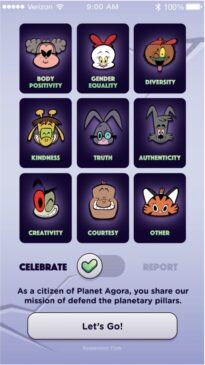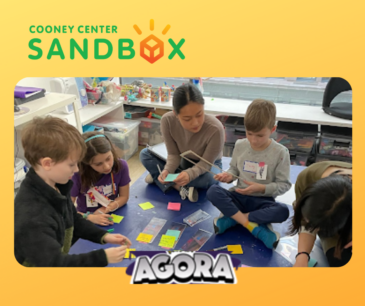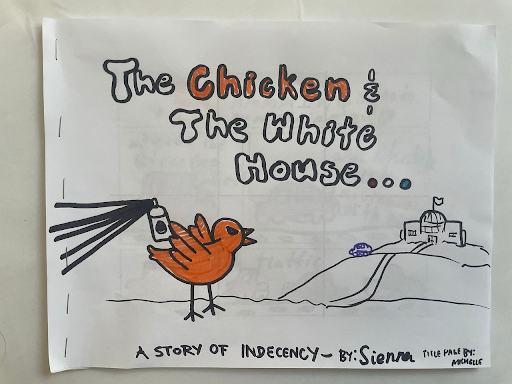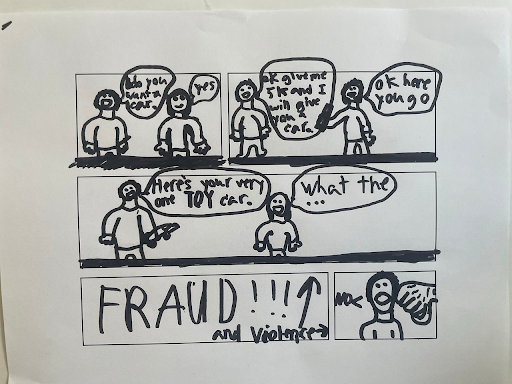In the tech world, kids’ ideas are often unnoticed and invisible. Even worse, when they voice their ideas, they might be dismissed or laughed at because we, as adults, may not know how to respond to their imagination. In partnership with the Cooney Center’s Sandbox initiative, we at The GIANT Room are working to give kids a seat at the design table of real products. We believe that this is not only beneficial for the kids themselves, but also for the designers of these products, as well as the quality of the product being developed. Through interactions with their intended users, designers will have a chance to learn more about kids’ worlds, their interests, needs, and perspectives — insight that goes beyond “usability” concerns. As a result, they will be more equipped to design products that are actually engaging, effective, accessible, and inclusive of kids with diverse backgrounds and cultures.
To highlight how kids have influenced the design of a real product, we invite you to read about the co-design process of Mrs Wordsmith’s Planet Agora, a social networking app for kids 8 to 13 years old, that was tested by a group of 30 GIANT kids over the course of two cycles of their product development.

Pierre Lagrange, chairman at Mrs. Wordsmith, wanted to create a product that enabled kids under 13 to engage with an age-appropriate social network. He said they wanted to “develop Planet Agora to empower kids with the social-emotional tools that help them champion positive values, while navigating the nuances of such concepts as diversity, body positivity, and gender equality.”
However, important questions remained about how to design a chatting app for kids that supports their social-emotional well-being. Could such an app help them learn about concepts such as gender equality, fake news, and indecency, while supporting them as they learn to act as moderators in their community? To answer these questions, designers from the Mrs Wordsmith team worked with the Cooney Center Sandbox and kids from the GIANT DesignLab to playtest, prototype, and co-design Planet Agora.
Involving Kids as Co-designers at the Very Early Stages of Product Development.
To truly understand kids’ perspectives on Planet Agora, the Mrs Wordsmith team started playtesting with kids from very early on, before they even had a playable digital prototype of their app. Designers from The GIANT Room prepared a paper prototype based on wireframes. The paper prototype was designed to answer specific fundamental questions about the user experience and interactions in the app such as:
- Engagement: How might kids moderate the content of their chats with their friends?
- Rewards System: How might kids react to the rewards mechanism in the app? What changes would they like to make? How would they go about designing a reward system to motivate them to moderate the content AND stay positive in the app?
- Social Emotional Skill Building: How might we design the app to help kids build social emotional skills and improve their digital literacy?
Playtesting the Paper Prototype
For our first co-design session, we had 20 kids (9 girls and 11 boys between 8-13 years old) join us for one of our playtesting and prototyping sessions in person in New York City.
Some of the parents who signed their children up for these sessions mentioned that their child had experienced “bullying” at school, or wanted to build their anti-bullying awareness. Others mentioned their kids spend a lot of time online, and they wanted to make sure their children are equipped with the digital literacy needed to navigate these experiences. Still others shared that their kids were interested in learning more about the thinking and decisions that go into making digital media such as movies, shows, and apps. These responses suggest that the product can address the real concerns of families.
One of the most important aspects of co-designing with kids is ensuring that all participants— kids and adults—feel comfortable sharing their thoughts and believe that their ideas and contributions have equal weight. We asked kid designers to examine the wireframe of the app and offer their impressions on the look and feel of the interface before playing with the paper prototype. As they played with the prototype, they showed a high level of engagement, chatting and moderating each others’ conversations. This was an important finding for the Mrs Wordsmith team, ensuring that the core experience of the app is in fact engaging for kids.

We also paid attention to how kids moderate content. We observed that kids can easily sense when something is “not nice,” but classifying offensive content under specific categories proved to be more challenging for them. In most cases, they could identify when content was an example of body shaming or racism, but found it much harder to identify “hate speech,” for example. These findings suggest that the Mrs Wordsmith team could gradually introduce players to more challenging pillars as they build their social-emotional skills.
Kid designers were then invited to prototype certain features of the app or new features they would like to be added to the app. They made their prototypes with arts and crafts materials, or simply by sketching their designs and then sharing with the adult designers. They made prototypes of their avatars, creator tool kits they would like to see in the app to customize their avatars, new features such as an SOS button to call their friends when they need support or when they felt they were being bullied in the app, modes of communication, and more.
Data from the paper playtesting also helped us to identify nuances in kids’ experiences in the app — how might kids react when being targeted with a negative comment? How might we design to allow or encourage “apologies?” How might we discern objective versus subjective moderation? How might we support kids when they feel targetted or when they need help in identifying a pillar? We aggregated data from playtesting and prototyping exercises from all four sessions, outlined findings to these questions, and provided a series of recommendations for the Mrs Wordsmith team to consider implementing in their next prototype for the app.
Designers come in all shapes and sizes. At Mrs Wordsmith, we believe in co-designing with the children who use our products, so we make sure to have them on board at every step of the design process. It’s not just talk. It’s about creating something that truly resonates.
— Lady San Pedro, Director of Business Innovation
Inviting Kid Co-Designers Back
For the second round of designing with kids, the Mrs Wordsmith team traveled to New York City and joined a group of eight kids at The GIANT Room for three sessions of co-designing and prototyping. For this round, they were interested in kids’ preferences for learning methods and instructional media (so that the app can more effectively facilitate social-emotional learning), kids’ attitude towards conflict, their relationships with adult counselors, and their views on online privacy and security.
During these sessions, GIANT kid-designers playtested the digital prototype of the app, engaged in deep conversations and interactions with the adult designers, exchanged ideas, provided feedback, and recommended new features or updates in the app. A number of the kid participants had previously joined the paper-prototype playtesting sessions and were ecstatic to see the Mrs Wordsmith team’s progress and to play with the digital version.
Kid vs Adult-Designed Instructional Materials
During these sessions, we learned that kids enjoy comics, videos, and animations that explain challenging concepts using examples to which they can relate and connect. For example, one GIANT kid-designer created a comic about indecency: a chicken spray paints the White House.

Another child teamed up with one of Mrs Wordsmith’s designers to write a comic about fraud. Together, they came up with the story of a friend who sold a car to another friend, but when the buyer received the car, he realized that it was actually a toy car — for the price of a real car! Funny and accurate, right? That’s what happens when we collaborate with kids to explain ideas in ways that are kid-friendly, effective, and engaging.

Kid-designed instructional materials were relatable, humorous, and concrete. This was in contrast to adult-designed materials which were filled with “formal” definitions and examples that were sometimes too far removed from the kids’ world.
Co-Designing the “Counseling” Feature in the App
Next, adult and kid-designers started discussing and co-designing the counseling feature in the app. We learned that kids care about who their counselors are; they want to have the choice to read about them including their gender and method of counseling, and sometimes they are willing to wait for their preferred counselor. Alternatively, they are also willing to speak with an “AI-counselor that’s not biased” as long as they know they are talking with an AI-bot. They also emphasized the importance of being able to explain themselves and having the chance to apologize. This is a pattern we also saw during the playtesting. Often when a child posted something that was offensive to others and was flagged, they immediately wanted to explain why they posted what they did and in many cases, it was obvious that they didn’t mean to offend someone. These moments of conflicts were golden learning moments for them to learn about Planet Agora’s pillars, reflect, and empathize with other users.
On Privacy and Security
Another surprising finding was how conscious and opinionated kids are when they are asked about their online privacy and security. They discussed how they wish they had agency over what can be shared about them by others. They even thought AI technology can play a role in securing their privacy — for example, if someone posts a photo of them without them knowing, AI can detect their face in the photo and notify them. They also came up with yet another “pillar” in Planet Agora — “Respecting each other’s privacy”. They wanted to flag messages that they thought might violate their privacy or someone else’s: “What if someone shares a photo of someone else’s private diary without them knowing? I want to be able to flag that post and I want it to become “blurred” right away so no one else can see it until we know if that person actually had the permission to post it.”
Bringing Kids’ Voices into Product Design Process
What we have shared in this post is just a small window into what we’ve learned about kids’ viewpoints and their ideas when it comes to designing a chatting app for them. When co-designing with kids, adult designers need to be conscious and aware enough to choose what to pay attention to and how to construct meaning from the experience. They need to be able to connect with kids, engage in meaningful conversations that actually elevate kids’ voices, and give them space to express themselves. They need to be able to ask questions, pause, and endure the silence without jumping to provide or suggest an answer. There is an art in co-designing with kids and if a product team succeeds in doing so, truly magical products can be developed – products that will be engaging, effective, and that are actually good for kids’ well-being.
We’re proud to be a part of the Sandbox Initiative from Joan Ganz Cooney Center; getting kids involved in the design process can make a huge difference in the industry and consequently, the lives of millions of kids around the world. The initiative makes it possible for product designers to connect with kids, make meaning of their interactions, and learn how they can apply their design findings into the product development process.

Azadeh Jamalian, is founder and CEO of The GIANT Room creative STEM organization, helping the next generation of creatives and inventors to think big and act on their most ambitious ideas. Jamalian is a TED speaker, former head of education strategy at littleBits, and co-founder of Tiggly. She has a proven record of designing learning products and programs that millions of children have engaged with, and thousands of schools have implemented in their programs. She has a PhD in cognitive studies in education from Teachers College, and has publications on a broad range of topics such as designing learning platforms for children, emerging educational tech, game design, mathematical education, and cognition.

